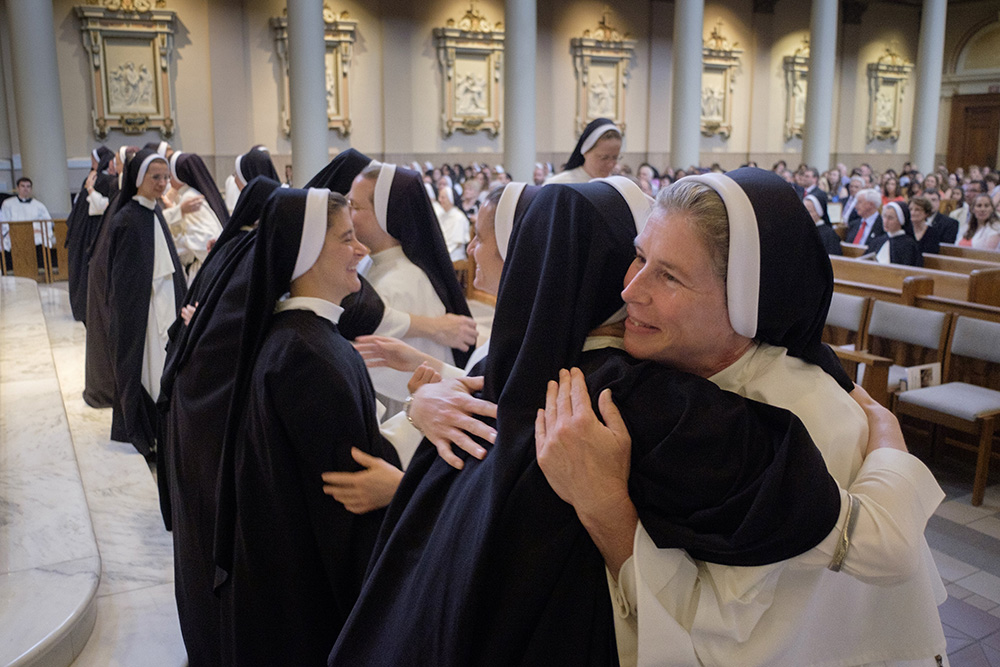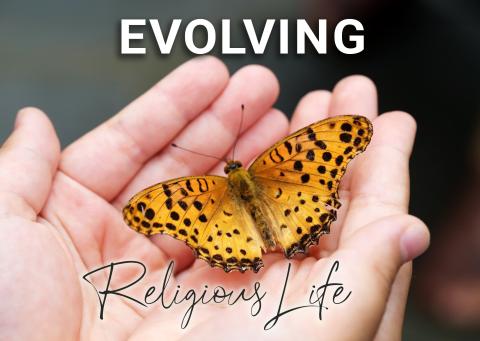
Sr. Maria Cecilia Neil embraces another member of the Dominican Sisters of St. Cecilia July 24, 2023, at the Cathedral of the Incarnation in Nashville, Tennessee, where 10 members of their congregation made their final profession of vows. (OSV News/Tennessee Register/Rick Musacchio)
Editor's note: "Evolving Religious Life," a new series from Global Sisters Report, is exploring how Catholic sisters are adapting to the realities of congregations in transition and new forms of religious life. While we write often about these trends, this particular series will focus more closely on sisters' hopes for the future.

What might be the future of religious life, especially that of women religious, as it becomes clearer that many of their communities will no longer exist, at least in their present form? Though no one really knows, one can hope the evolution of these women and their communities will evolve from what Robert Kegan calls in The Evolving Self an institutional stage of human development to an interindividual stage. The new stage will be based on interpersonal relationships along with conceiving of oneself as a unique individual.
For centuries, women religious have conceived of themselves primarily as members of communities based in institutions. There were those within which they lived, like their large convents and motherhouses; and those they established, managed and sponsored, like their hospitals, schools and orphanages. In addition to these brick-and-mortar institutions, documents and traditions guided them and their communities in ecclesial matters and cultural relationships.
The details of their lives were defined by Canon Law, the rules of foundresses and founders, the constitutions that characterized their membership in larger religious orders and the directives of those in authority along with the decisions they made communally. Until recently, for example, they were told how to dress, where they could live, how they needed to restrict access to their living quarters and how they made communal decisions.
Advertisement
As a consequence, they tended to think of themselves as members of a specific group, such as a Sister of St. Francis of Perpetual Adoration of Colorado Springs. As such, they could rest on the laurels of their impressive communal ministries. The majority of Catholics and non-Catholics thought highly of them. They enjoyed respect because of their wholesome values, communal aspirations and remarkable effectiveness in most of what they did through their foundations.
Things changed, however, as societies evolved and many governmental and societal institutions became less viable, if not fell into disrepute. Thus, women religious, like many other members of institutions, are now being called to evolve to a post-institutional stage of development.
For this evolution to occur, women religious have to consciously relinquish what no longer "works." Though they can retain select life-giving aspects of their distinctive lifestyles, like their vows and charisms, they have to replace traditional expressions of them. They have to embrace what is different and unfamiliar and, as a consequence, threatening to their self-identity. They have to move from their old psychological "home" to a new one based primarily on interdependence and interindividuality.
This undertaking will affect their way of making meaning. It will call for different thinking designed to give plausible — and thus stabilizing — explanations of what is happening within and around them. Women religious must adopt new attitudes that affect them at deep emotional levels. They are likely to experience painful fear and depression, along with challenges related to how they express their frustration and anger. The latter will not be "kept to oneself" and processed within, as in the past. It will have to be processed both individually and communally. It will have to find wholesome, carefully designed outward expressions.
Thus, changing from an institutional to an interindividual level of development will affect the behavior of women religious. They will no longer be able to play some of the roles they have used to define themselves. They will have to learn and act in accordance with new ones. They will have to perform new functions that meet the needs of the times: others' and their own. They will have to diminish their reliance on rules and laws defining who they are and what they do or do not do. Instead, they will base those definitions and decisions on personal and interpersonal situations and circumstances: what appears to be feasible, realistic and wholesome at a given time and place. They might open their residences to the laity, for example, if that is best for them and others.

Sr. Marilyn Baker, a member of the Sisters of Providence of Saint Mary-of-the-Woods in western Indiana, talks with Maddie Kervick of the Diocese of Springfield, Massachusetts, on Nov. 16, 2023, in the Indiana Convention Center in Indianapolis. They were there for the National Catholic Youth Conference, a biennial event that draws 12,000 Catholic teenagers from across the country. (OSV News/The Criterion/Sean Gallagher)
From another perspective, the decisions of women religious will be based on instinct as well as judgment related to what form of love is needed in a particular circumstance by unique persons in that circumstance. They will be based on discernment done by all involved.
In The Achieving Society by David McClelland, he explains that movement to the interindividual stage of development consists of letting go of an achievement orientation and embracing an intimacy orientation: relying less on what is done and more on who one is — or could be. It is a matter of assuming internal authority rather than relying on external authority. It becomes a matter of being true to oneself rather than faithful to a regulated way of life. It is a matter of taking personal responsibility for how one thinks and thus acts. There is no escape into "My decisions and behavior have been determined by respectable traditions and objective laws. I must do what I am doing regardless of the needs of other persons, indeed all of creation."
This movement entails a major paradigm shift. If women religious make this shift, they will achieve the integration of autonomy and intimacy, a defining characteristic of the interindividual stage of human development. They will reach a level of maturity rare in the history of humankind. They will move from a closed system of self and group sufficiency to a "more open and dialectical process involving contextualization," as Carol Gilligan and JM Murphy wrote. Their lifestyles will be characterized by "both-and" thinking and dialogue versus the polarities of "either-or" thinking and the imposition of objective regulations.
Indeed, this paradigm shift consists of being psychologically close to others as well as putting others and oneself above law and order while not being impervious to them. They will still inform women religious but not be the ultimate determination of what they do and how they define themselves. Consequently, this will make a profound difference in how they and others experience religious life. All involved will be loved so authentically in a given context that they feel loved. Love will cease to be primarily a good intention or abstraction. That is the good news!
For this evolution to occur, women religious have to consciously relinquish what no longer "works."
The not-so-good news is that women religious will not necessarily be sure of their doing "what is right" — as they could be in the past. But it is fair to say that they will come to know the historical Jesus of Nazareth and his presence among us as the cosmic Christ in new and very life-giving ways. Furthermore, they will experience new forms of integrity based on being true to themselves, those with whom they collaborate and all of creation.
Indeed, the entire people of God will be able to bear witness to the son of God being still among them. They will be able to say, "We know that because of being found worthy of genuine love and concern in today's demanding and dangerous circumstances. There is no doubt about it!"
This will then be accompanied by women religious taking better care of themselves as real persons rather than ideal members of ecclesiastical and societal institutions that have expended them — even as they permitted themselves to be expended — in the service of "everyone."
Will women religious choose to consciously move from an institutional to an interindividual level of development? Judging from their earnestness, sincerity and integrity throughout the centuries, they probably will. So far, their record of adapting to what God is asking of them at the time is impressive.





